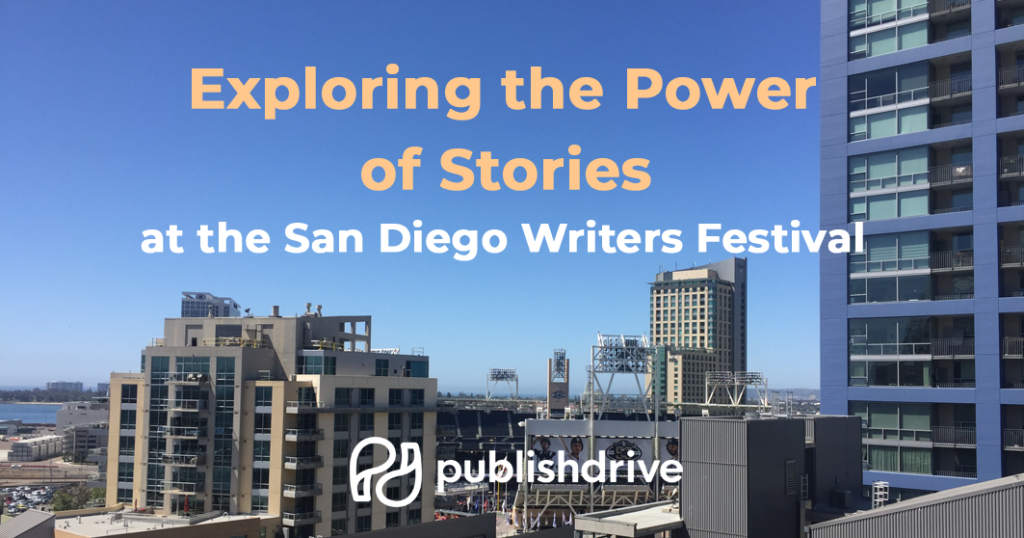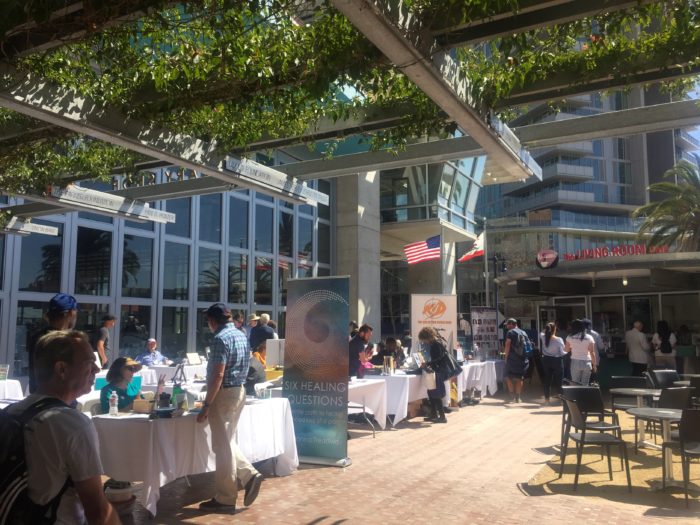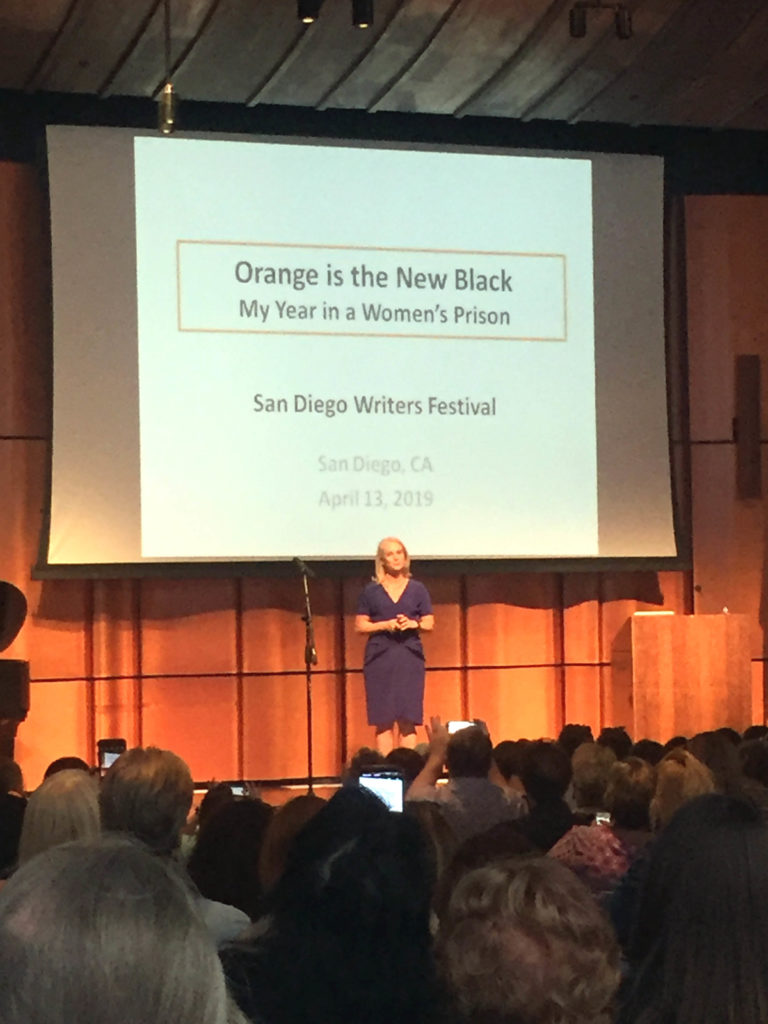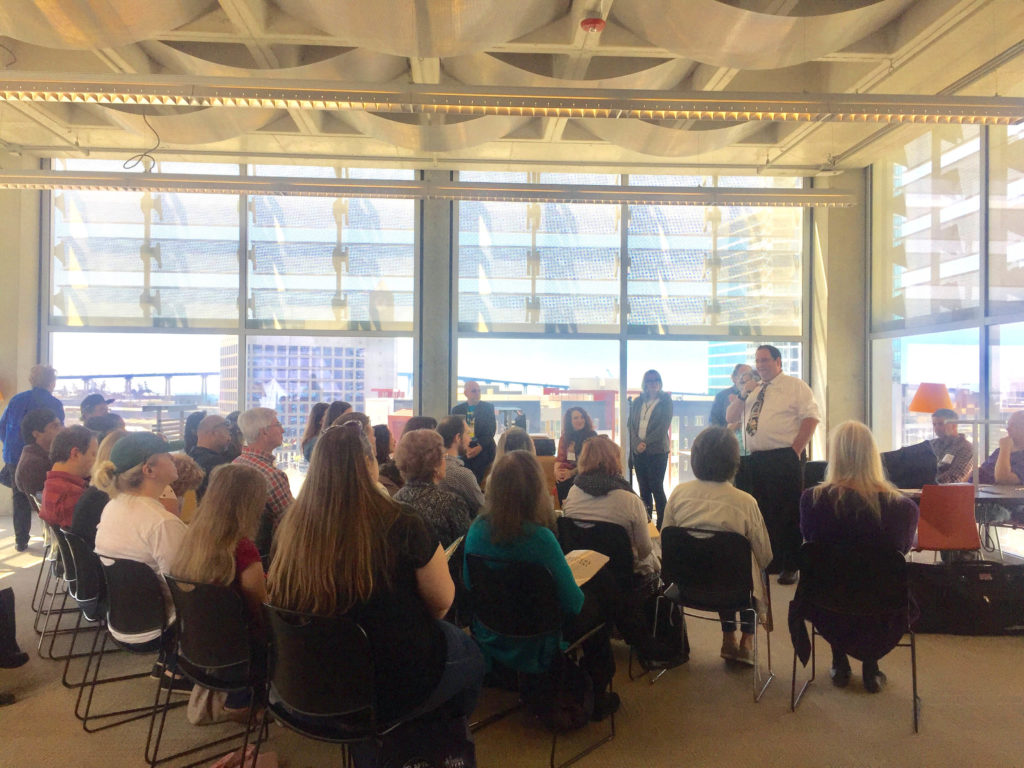Exploring the Power of Stories at the 2019 San Diego Writers Festival

I recently attended the first annual San Diego Writers Festival at the beautiful Central Library in downtown San Diego. Throughout the festival’s presentations and performances, I encountered a recurring theme: “the power of stories.”
The power of stories is what drove many of us to write in the first place, and of course, it’s why we read. But this power goes far beyond allowing us to temporarily escape in a book. The speakers and presenters at the San Diego Writers Festival showed us that stories can also drive social change and allow those who’ve been silenced to claim their own narrative.
If you didn’t have a chance to make it to this year’s festival, this recap will give you an overview of the great things happening in San Diego’s literary scene, and I’ll take a closer look at how the presentations explored the power of stories.
SD Writers Festival 2019 Recap

After the opening festivities, I headed to the outdoor garden courtyard, where there was a small gathering of vendors and authors set up. I expect this section will grow as the festival gains more traction next year.
It was great to see so many self-published authors getting out there and working hard to promote their work. One local author I spoke to, Will Lange, stated that writers conferences and festivals are an important part of his marketing strategy. “I love festivals,” he said, “because I always sell a fair amount of copies and it gives me the opportunity to meet people in the community.”
In addition to boosting marketing efforts, festivals provide a way for writers to connect and network in an otherwise solitary profession. When I caught up with Will after the festival, he echoed some of my same thoughts.
“Reading and writing is essentially a solo sport,” he said, “which is good, but also leads to a feeling of isolation. Having a festival like we just attended definitely brings everyone together in a fun way. I actually made some bookish friends the other day who I’ve stayed in contact with since.”
Piper Kerman and the Intention of Our Writing

After chatting with authors, I headed into the packed auditorium to see bestselling author Piper Kerman’s keynote speech. Through her insightful talk, she recounted the connections she made with other women during her 13-month incarceration for drug trafficking, and she hit us with the facts:
- In recent decades, the population of incarcerated women in the U.S. has risen 650%.
- Many of these women are incarcerated for low-level offenses.
- Incarcerated women in the U.S. are disproportionately women of color.
Stats like these are widely available, but they fly under the radar for the average person. But after Kerman’s bestselling book and TV show (“Orange is the New Black”) were released, more people started to question America’s use of incarceration.
This is all thanks to the power of stories. People don’t really pay attention to stats; what they do pay attention to is stories that move them.
Kerman knew this, and when she wrote the book, she had a specific goal in mind. “If I do it in a pop culture way,” Kerman said, “maybe people will pick up a book about prison that they otherwise wouldn’t.”
Through effective storytelling, her book has left us with these important takeaways:
- Who is in prison and why are they there?
- What’s it like to live your life every day behind the wire? And what does this do to these women, their families, and their communities?
She also made us question: “What is the intention of our writing?”
Workshops and Panel Discussions

For the rest of the afternoon, I attended various workshops and panel discussions. There was a good mix of presentations relating to both craft and building a successful author business. San Diego Writers, Ink. hosted an “Ask an Expert” chat where authors could ask questions about finding genre-specific classes, figuring out taxes and royalties, landing writing opportunities, and much more.
There were also open pitch sessions, where writers could pitch their work to literary agents and film producers. Authors also learned how to avoid the slush pile with expert advice from a literary agency.
As a self-published romance author, I was excited to see so much interest in the romance writing session. The room was packed, and we were all eager to hear bestselling author Lisa Kessler share her advice about how to become a successful romance author.
During Kessler’s talk, I was reminded again why I love the romance community so much.
New authors just beginning their self-publishing journey might feel intimidated by the competition. But Kessler assured the group: “Don’t look at each other as competitors. Look at it like, ‘Who should be on my team?’ Because we can’t keep up with readers.”
It’s true that romance readers are voracious, with some reading two novels per day; there will always be enough readers out there who can’t wait to find their next must-read book.
Kessler’s advice was to make connections with other authors through RWA. These connections often lead to business partnerships, allowing authors to take advantage of cross-promotions and other techniques to drive sales.
Stories Give a Voice to Those Who’ve Been Silenced
As the afternoon wound down, I attended a panel discussion: “Utopia, Dystopia, and Feminism” with Kirsten Imani Kasai, Mona de Vestel, and Michelle Zive, PhD. They explored how those who’ve been silenced (or who live between identities) can use stories to claim their own narrative.
Kirsten Kasai pointed out that that some are hesitant about sharing their life stories, because they feel like they don’t have a right, due to louder, more dominant voices. For instance, people who are biracial, not “queer enough” for the queer community, or deemed irrelevant in some way. “We can’t let the same people tell the same stories for everyone else,” she said.
Mona de Vestel echoed these thoughts, stating that stories allow you to “step into your own power and claim your narrative, despite the pressures that push back.”
Not only do stories give a voice to those who’ve been silenced, but they can create meaningful change. Kirsten Kasai referenced a study that stated fiction is one of the most effective ways to build empathy.
“Stories create a mutual ground of empathy,” she said. “If we want to change the destination, we have to allow those who’ve been silenced to forge a new path, and more people will travel those new paths.”
Multi-Sensory Storytelling
My favorite part of the festival was at the very end, when I caught a performance by Fiction International and the band, A Hundred Ghosts. They put on a storytelling experience that blended music and spoken word in a way that was truly captivating.
The music included two electric guitars, a bass clarinet, a violin, and electronic effects that beautifully enhanced the readings. As the authors and poets performed their readings, they explored themes of domestic abuse and drug addiction while the musicians created a layered, ambient sound that you couldn’t help but get lost in. Several of us in attendance agreed it was one of the most powerful and unique literary performances we’d experienced.
Closing Thoughts
I was so impressed with the talent at this year’s San Diego Writers Festival, and the turnout was great. And the best part? It’s free! I’m sure next year will be even better, and I’m looking forward to seeing this festival grow.
If you attended the festival and it gave you the motivation to finally publish that manuscript you’ve been working on, take the next step! With PublishDrive, we’ve made it simple to convert your manuscript into an ebook and publish it in over 400+ stores worldwide, including Amazon, Barnes & Noble, Apple Books, Google Play, and Kobo. Sign up today to get started!